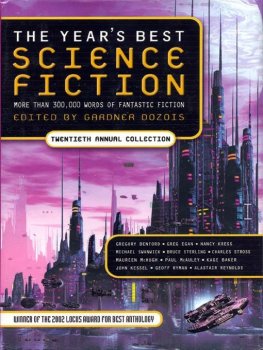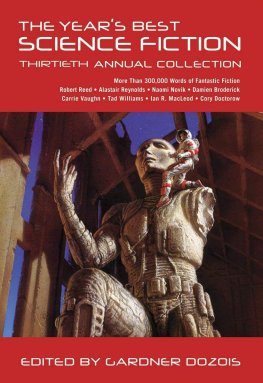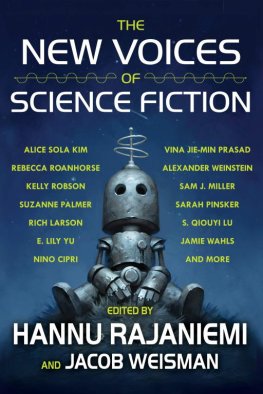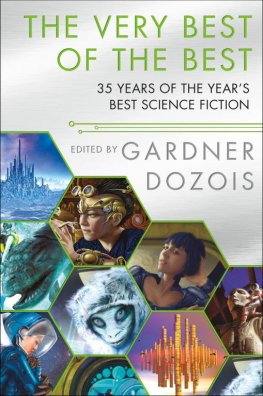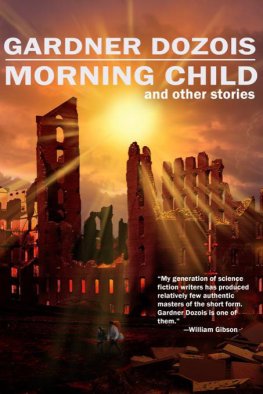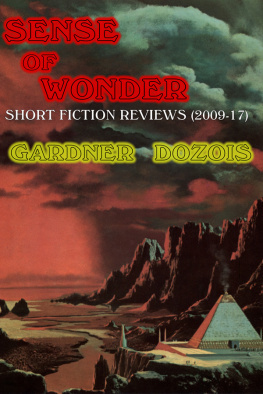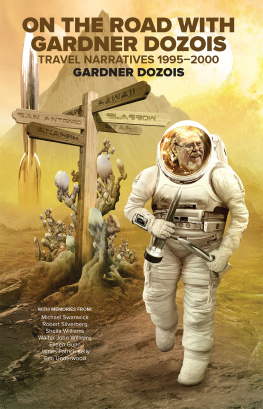ALSO BY GARDNER DOZOIS
ANTHOLOGIES |
A DAY IN THE LIFE ANOTHER WORLD BEST SCIENCE FICTION STORIES OF THE YEAR #6-10 THE BEST OF ISAAC ASIMOVS SCIENCE FICTION MAGAZINE TIME-TRAVELERS FROM ISAAC ASIMOVS SCIENCE FICTION MAGAZINE TRANSCENDENTAL TALES FROM ISAAC ASIMOVS SCIENCE FICTION MAGAZINE ISAAC ASIMOVS ALIENS ISAAC ASIMOVS MARS ISAAC ASIMOVS SF LITE ISAAC ASIMOVS WAR ROADS NOT TAKEN (with Stanley Schmidt) THE YEARS BEST SCIENCE FICTION, #1-25 | FUTURE EARTHS: UNDER AFRICAN SKIES (with Mike Resnick) FUTURE EARTHS: UNDER SOUTH AMERICAN SKIES (with Mike Resnick) RIPPER! (with Susan Casper) MODERN CLASSIC SHORT NOVELS OF SCIENCE FICTION MODERN CLASSICS OF FANTASY KILLING ME SOFTLY DYING FOR IT THE GOOD OLD STUFF THE GOOD NEW STUFF EXPLORERS THE FURTHEST HORIZON WORLDMAKERS SUPERMEN |
COEDITED WITH SHEILA WILLIAMS |
ISAAC ASIMOVS PLANET EARTH | ISAAC ASIMOVS CHRISTMAS |
ISAAC ASIMOVS ROBOTS | ISAAC ASIMOVS CAMELOT |
ISAAC ASIMOVS VALENTINES | ISAAC ASIMOVS WEREWOLVES |
ISAAC ASIMOVS SKIN DEEP | ISAAC ASIMOVS SOLAR SYSTEM |
ISAAC ASIMOVS GHOSTS | ISAAC ASIMOVS DETECTIVES |
ISAAC ASIMOVS VAMPIRES | ISAAC ASIMOVS CYBERDREAMS |
ISAAC ASIMOVS MOONS |
COEDITED WITH JACK DANN |
ALIENS! | MERMAIDS! | DINOSAURS! | INVADERS! | CLONES |
UNICORNS! | SORCERERS! | LITTLE PEOPLE! | ANGELS! | NANOTECH |
MAGICATS! | DEMONS! | DRAGONS! | DINOSAURS II | IMMORTALS |
MAGICATS 2! | DOGTALES! | HORSES! | HACKERS |
BESTIARY! | SEASERPENTS! | UNICORNS 2 | TIMEGATES |
FICTION |
STRANGERS | SLOW DANCING THROUGH TIME |
THE VISIBLE MAN (Collection) | (with Jack Dann, Michael Swanwick, |
NIGHTMARE BLUE | Susan Casper and Jack C. Haldeman II) |
(with George Alec Effinger) | THE PEACEMAKER |
GEODESIC DREAMS (collection) |
THE FICTION OF JAMES TIPTREE, JR.
Turings Apples
STEPHEN BAXTER
Stephen Baxter made his first sale to Interzone in 1987, and since then has become one of that magazines most frequent contributors, as well as making sales to Asimovs Science Fiction, Science Fiction Age, Analog, Zenith, New Worlds, and elsewhere. Hes one of the most prolific new writers in science fiction, and is rapidly becoming one of the most popular and acclaimed of them as well, one who works on the cutting edge of science, whose fiction bristles with weird new ideas, and often takes place against vistas of almost outrageously cosmic scope. Baxters first novel, Raft, was released in 1991, and was rapidly followed by other well-received novels such as Timelike Infinity, Anti-Ice, Flux, and the H. G. Wells pastichea sequel to The Time MachineThe Time Ships, which won both the John W. Campbell Memorial Award and the Philip K. Dick Award. His other books include the novels Voyage, Titan, Moonseed, Mammoth, Book One: Silverhair, Manifold: Time, Manifold: Space, Evolution, Coalescent, Exultant, Transcendent, Emperor, Resplendent, Conqueror, Navagator, Firstborn, and The H-Bomb Girl, and two novels in collaboration with Arthur C. Clarke, The Light of Other Days and Times Eye, a Time Odyssey. His short fiction has been collected in Vacuum Diagrams: Stories of the Xeelee Sequence, Traces, and Hunters of Pangaea, and he has released a chapbook novella, Mayflower II. Coming up are several new novels, including Weaver, Flood, and Ark.
As the disquieting story that follows suggests, perhaps its better if the search for extraterrestrial intelligence doesnt succeed....
Near the centre of the Moons far side there is a neat, round, well-defined crater called Daedalus. No human knew this existed before the middle of the twentieth century. Its a bit of lunar territory as far as you can get from Earth, and about the quietest.
Thats why the teams of astronauts from Europe, America, Russia and China went there. They smoothed over the floor of a crater ninety kilometres wide, laid sheets of metal mesh over the natural dish, and suspended feed horns and receiver systems on spidery scaffolding. And there you had it, an instant radio telescope, by far the most powerful ever built: a super-Arecibo, dwarfing its mother in Puerto Rico. Before the astronauts left they christened their telescope Clarke.
Now the telescope is a ruin, and much of the floor of Daedalus is covered by glass, Moon dust melted by multiple nuclear strikes. But, Im told, if you were to look down from some slow lunar orbit you would see a single point of light glowing there, a star fallen to the Moon. One day the Moon will be gone, but that point will remain, silently orbiting Earth, a lunar memory. And in the further future, when the Earth has gone too, when the stars have burned out and the galaxies fled from the sky, still that point of light will shine.
My brother Wilson never left the Earth. In fact he rarely left England. He was buried, what was left of him, in a grave next to our fathers, just outside Milton Keynes. But he made that point of light on the Moon, which will be the last legacy of all mankind.
Talk about sibling rivalry.
2020
It was at my fathers funeral, actually, before Wilson had even begun his SETI searches, that the Clarke first came between us.
There was a good turnout at the funeral, at an old church on the outskirts of Milton Keynes proper. Wilson and I were my fathers only children, but as well as his old friends there were a couple of surviving aunts and a gaggle of cousins mostly around our age, mid-twenties to mid-thirties, so there was a good crop of children, like little flowers.
I dont know if Id say Milton Keynes is a good place to live. It certainly isnt a good place to die. The city is a monument to planning, a concrete grid of avenues with very English names like Midsummer, now overlaid by the new monorail. Its so clean it makes death seem a social embarrassment, like a fart in a shopping mall. Maybe we need to be buried in ground dirty with bones.
Our father had remembered, just, how the area was all villages and farmland before the Second World War. He had stayed on even after our mother died twenty years before he did, him and his memories made invalid by all the architecture. At the service I spoke of those memoriesfor instance how during the war a tough Home Guard had caught him sneaking into the grounds of Bletchley Park, not far away, scrumping apples while Alan Turing and the other geniuses were labouring over the Nazi codes inside the house. Dad always said he wondered if he picked up a mathematical bug from Turings apples, I concluded, because, he would say, for sure Wilsons brain didnt come from him.
Next page

